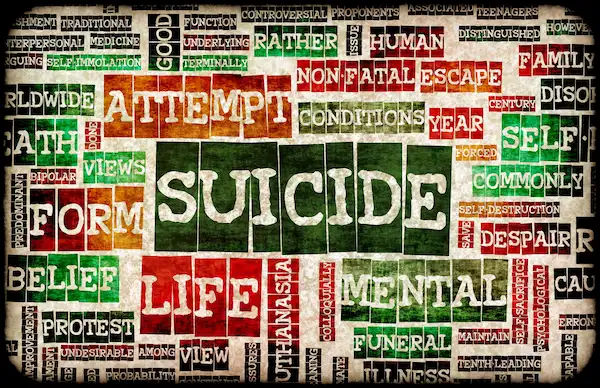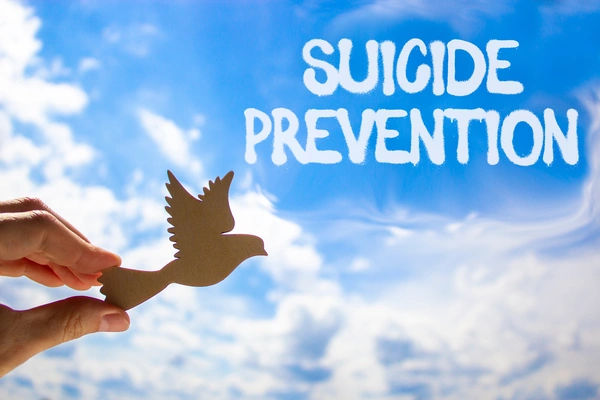Guide to Prevent Suicidal Attempts Let's Talk About It!
Learn how to recognise warning signs, have compassionate conversations, and take immediate action to prevent suicidal attempts. Your intervention can save lives.

Written by Dr. Siri Nallapu
Reviewed by Dr. Shaik Abdul Kalam MD (Physician)
Last updated on 13th Jan, 2026

Introduction
Worrying that someone you love might be considering suicide is one of the most frightening experiences imaginable. The weight of responsibility, the fear of saying the wrong thing, and the overwhelming nature of the topic can leave you feeling paralysed. But here’s the most critical thing to know: your intervention can save a life. This guide is designed to empower you with knowledge and actionable steps. We will move beyond the fear and silence to talk openly about suicidal attempts, understanding that conversation is the first and most powerful step toward prevention. We’ll cover how to recognise the subtle and overt warning signs, how to initiate a compassionate and direct conversation, what to do in a crisis, and how to support long-term recovery. Remember, you don't need to be a mental health expert to make a difference. You just need to be present, caring, and informed. Let’s talk about it.
Understanding the Urgency: Why Talking About Suicide Matters
Suicide is a leading cause of death globally, but it is often preventable. The stigma surrounding mental health and suicide can create a wall of silence, isolating those who are suffering and preventing them from seeking help. Breaking this silence is a matter of life and death.
Breaking the Silence: The Power of a Conversation
A pervasive myth suggests that talking about suicide might plant the idea in someone’s head. This is unequivocally false. For a person in profound emotional pain, having someone acknowledge their struggle openly can be an immense relief. It validates their experience and communicates that they are seen and heard. Asking, "Are you thinking about suicide?" does not encourage the act; it opens a door for help. It transforms a solitary, terrifying internal struggle into a shared problem that can be faced together.
Debunking Common Myths About Suicide
1. Myth: People who talk about suicide are just seeking attention.
Fact: Any mention of suicide must be taken seriously. It is often a desperate plea for help.
2. Myth: Someone who is determined to die by suicide cannot be stopped.
Fact: Suicidal crises are often temporary and acute. With immediate support and proper intervention, lives can be saved.
3. Myth: Only people with a mental health condition are at risk.
Fact: While mental health conditions are a significant risk factor, suicide can also be driven by overwhelming life circumstances, such as financial loss, chronic pain, or trauma.
Consult a Specialist for the best advice
Recognising the Red Flags: Key Warning Signs of Suicide
Prevention starts with recognition. The signs can be verbal, behavioural, or mood-based. Often, it's a combination that signals acute risk.
Verbal and Emotional Cues to Listen For
Listen carefully if someone starts expressing feelings of being trapped, unbearable pain, or of being a burden to others. Key phrases to take seriously include:
• "I can't take it anymore."
• "Everyone would be better off without me."
• "I just want the pain to stop."
• "There's no way out."
They may also talk about killing themselves, having no reason to live, or say goodbye to people as if it's final.
Behavioural Changes That Signal Deep Distress
Behavioural changes are often the most observable signs. These include:
1. Withdrawing from friends, family, and social activities.
2. Increased use of alcohol or drugs.
3. Researching ways to die or acquiring means (e.g., pills, weapons).
4. Giving away prized possessions or making unexpected arrangements.
5. Extreme mood swings, including sudden calmness after a period of despair (which can indicate a decision to end their pain has been made).
6. A dramatic change in sleep or eating patterns.
The Lifesaving Conversation: How to Talk to Someone You’re Worried About
If you notice these signs, it's time to talk. This conversation may feel daunting, but your calm, non-judgmental approach is what matters most.
Step 1: Finding the Right Time and Place
Choose a private setting where you won't be interrupted. Allow plenty of time so the conversation isn't rushed. Approach them with genuine concern, saying something like, "I've noticed you seem really down lately, and I'm worried about you."
Step 2: Asking the Direct Question with Compassion
Be clear and direct. It’s okay to use the word "suicide." You can say, "When you talk about feeling hopeless, it makes me wonder: are you thinking about suicide?" This directness shows you are strong enough to handle their truth and reduces ambiguity.
Step 3: Listening Without Judgment
If they say yes, your primary role is to listen. Avoid debating the value of life, lecturing, or offering simplistic solutions. Use empathetic statements: "That sounds incredibly painful," or "I can't imagine how hard this is, but I'm here with you." Your goal is to connect and understand, not to solve everything in one conversation.
What to Avoid Saying: Common Well-Intentioned Mistakes
1. Don't say: "You have so much to live for!" → This minimises their pain.
Instead, try: "Help me understand what makes life feel so difficult right now."
2. Don't say: "This is selfish." → This adds guilt and shame.
Instead, try: "You must be carrying a tremendous amount of pain to feel this way."
Immediate Action Steps: What to Do in a Crisis
If the person indicates they are in immediate danger, your response must shift from conversation to crisis intervention.
Never Leave the Person Alone
Your first priority is their immediate safety. Do not leave them alone. If you cannot be there in person, contact someone who can be until professional help arrives.
Removing Immediate Dangers: Means Reduction
If it is safe to do so, help remove or secure potential means of self-harm. This could involve locking up medications, firearms, or other dangerous items. Means reduction is one of the most effective strategies for preventing suicidal attempts, as it creates a crucial barrier between a suicidal impulse and a fatal action.
Reaching Out for Professional Help Together
You do not have to handle this alone. In a crisis, immediate professional support is essential. If someone is in crisis, these immediate steps can help ensure their safety and support:
• Call or text 112: This is the Suicide Hotline in the India, available 24/7.
• Go to the nearest emergency room.
• Offer to make the call or go with them.
Your presence can provide immense comfort and practical support. If their condition feels unmanageable, consulting a doctor online with Apollo24|7 can be a first step to connect with a professional who can assess the urgency and guide next steps.
Building a Long-Term Shield: Strategies for Ongoing Suicide Prevention
Surviving a crisis is the first step. Long-term recovery involves building a robust support system and developing coping skills.
Creating a Safety Plan: A Personalised Roadmap to Hope
A safety plan is a written, step-by-step list a person creates with a professional or trusted person to use when they feel a crisis coming on. It includes:
1. Warning signs.
2. Internal coping strategies (e.g., distraction techniques).
3. People and social settings that provide distraction.
4. Trusted people to contact.
5. Professionals or agencies to contact.
6. How to make the environment safe.
The Role of Professional Therapy and Medication
Underlying issues like depression, anxiety, or trauma often need professional treatment. Therapies like cognitive behavioural therapy (CBT) and dialectical behaviour therapy (DBT) are highly effective in addressing suicidal thoughts. A psychiatrist may also recommend medication to help stabilise mood. If symptoms of depression persist beyond two weeks, consult a doctor online with Apollo24|7 for further evaluation and to discuss treatment options.
Fostering Protective Factors and Resilience
Strengthening "protective factors" can buffer against suicidal thoughts. These include:
1. Strong social connections with family and friends.
2. Effective problem-solving and coping skills.
3. A sense of purpose or meaning in life.
4. Access to effective mental healthcare.
5. Encouraging hobbies, physical activity, and healthy routines can also contribute significantly to overall well-being.
Taking Care of Yourself: Support for the Helper
Supporting someone who is suicidal is emotionally taxing. It's vital to practice self-care. You cannot pour from an empty cup. Talk to a trusted friend or a therapist about your own feelings. Set healthy boundaries to protect your own mental health. Your well-being is essential to being a sustainable source of support.
Conclusion: You Are Not Alone in This Fight
Preventing a suicidal attempt is a courageous act of love and connection. It begins with the willingness to see the signs, have the difficult conversation, and take decisive action. Remember, you are not responsible for "fixing" someone's pain, but you can be the bridge that connects them to the professional help they need. By talking openly, offering compassion without judgment, and knowing the resources available, you become a powerful force for prevention. Your intervention matters. If you are the one struggling, please know that the pain you feel is real, but it is not permanent. Reach out. You are worth saving.
Consult a Specialist for the best advice
Consult a Specialist for the best advice

Mr. Aman Kochhar
Psychologist
2 Years • MA - Psychology, Post Graduate Diploma In Guidance and Counselling
New Delhi
Well-mind Counselling, New Delhi

Ms Rajashree Navthale
Psychotherapy & Counselling (ASM)
8 Years • MA in Counselling & Psychotherapy, PG Diploma in Counselling & Psychotherapy.
Akola
Connect Counselor, Akola

Dr. M Shyamala Devi
Psychologist
33 Years • DCH, MRCP, MRCH
Chennai
Apollo Children Hospitals Greams Road, Chennai
Ms. Aleena Babu
Clinical Psychologist
5 Years • M.Sc Clinical Psychology
Bengaluru
Apollo Clinic, Sarjapur Road, Bengaluru

Dr. Vivek S
Psychologist
13 Years • Ph. D. in Psycho-sexual Counselling, Psychotherapy & Sex Therapy, Certificate in Advance level in Psychology
Pune
Purl Wellness, Pune
(25+ Patients)
Consult a Specialist for the best advice

Mr. Aman Kochhar
Psychologist
2 Years • MA - Psychology, Post Graduate Diploma In Guidance and Counselling
New Delhi
Well-mind Counselling, New Delhi

Ms Rajashree Navthale
Psychotherapy & Counselling (ASM)
8 Years • MA in Counselling & Psychotherapy, PG Diploma in Counselling & Psychotherapy.
Akola
Connect Counselor, Akola

Dr. M Shyamala Devi
Psychologist
33 Years • DCH, MRCP, MRCH
Chennai
Apollo Children Hospitals Greams Road, Chennai
Ms. Aleena Babu
Clinical Psychologist
5 Years • M.Sc Clinical Psychology
Bengaluru
Apollo Clinic, Sarjapur Road, Bengaluru

Dr. Vivek S
Psychologist
13 Years • Ph. D. in Psycho-sexual Counselling, Psychotherapy & Sex Therapy, Certificate in Advance level in Psychology
Pune
Purl Wellness, Pune
(25+ Patients)
More articles from Suicide and suicidal thoughts
Frequently Asked Questions
1. What should I do if someone tells me they are suicidal online or via text?
Take it seriously. If you know their location, contact emergency services in their area. If not, encourage them to call 988 immediately. Stay on the line with them, express your concern, and try to get a trusted person physically with them.
2. Is it normal to feel scared or unsure about how to help?
Absolutely. It is a normal and common reaction. The most important thing is to push past the fear and reach out. Your calm presence, even if you feel uncertain, is more powerful than silence.
3. How can I support a loved one after a suicide attempt?
Offer non-judgmental emotional support. Help them follow up with medical and mental health appointments. Listen more than you talk. Be patient, as recovery takes time. Encourage them to develop a safety plan.
4. What if the person gets angry or denies it when I ask?
Thank them for talking with you and reiterate that you care. Their reaction may be due to shame or fear. You have still planted a seed that someone cares. Let them know you are there whenever they want to talk.
5. Are there specific risk factors for teen suicide?
Yes, in addition to general risk factors, teens are particularly vulnerable to bullying, academic pressure, social media-related stress, and family conflict. Any talk of suicide from a young person must be taken with the utmost seriousness.



